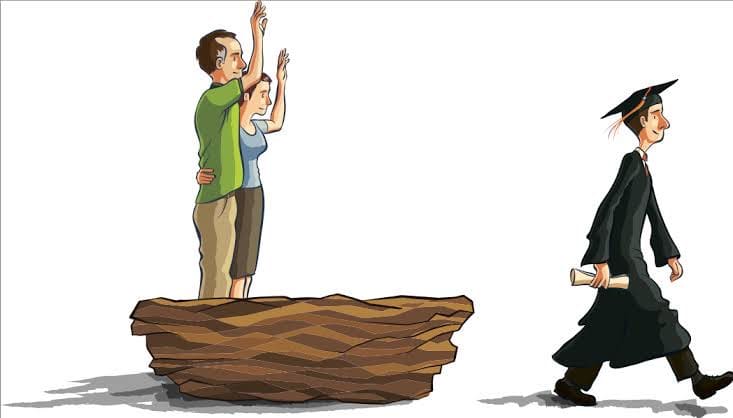I know we were taught to “never look back” or to just “keep moving forward.” I believe that sometimes it’s healthy to look back. Look back at those who stood still when you went out to be your own person—those people you left so far behind because life moved too fast.
“Well, here at last, dear friends, on the shores of the sea comes the end of our fellowship in Middle-earth. Go in peace! I will not say: do not weep; for not all tears are an evil.” ― J.R.R. Tolkien, The Return of the King
Do you remember the day you learned how to ride a bike? Or when you were dropped off for your first day of school? It was confusing, and more than that, it was daunting beyond comparison. But after we finally let go and had our first taste of independence, it felt awfully good, so much so that we forgot to look back—back at the person who held onto us until we were ready to be on our own. The moment they took their hands off the back of our bikes or handed us our school bags, we left filled with excitement and fear of what came next while they stood still, watching us move ahead in life. That parent, sibling, friend, or whoever else who guided us through those initial steps is the reason behind our great adventures. And at the end of the day, when we look back at them, we thank our lucky stars for having the guts to leave when, in fact, the real strength came from those who were left behind.
For every young adult leaving for college, for every soldier leaving to defend their country, and for every death in the world, there is a parent, a spouse, and a loved one who had to let go. And while letting go is something that goes both ways, being left behind is often harder than leaving.
The worst part of it all is usually the memories you’re forced to live with while you go about your regular life. My boyfriend encountered this great work opportunity that prompted his move to London. It’s easy to feel jealous or neglected, while the other person enjoys the thrill of their new life. And then you start to hate yourself for feeling the way you do. There are too many mixed emotions, and it’s hard to deal with that, but at the end of the day, you keep trying to make it work anyway.” – said Sara, a 24-year-old, while discussing her long-distance relationship.
A separation like this usually leaves a person feeling helpless and stuck.
For surrogates, the separation from the children they give birth to can be emotionally challenging. While they may understand the arrangement intellectually, the emotional bond formed during pregnancy and childbirth can still be strong. And after providing the ultimate gift of making someone a parent, they go home alone, feeling like a mother but not actually being one. Similarly, when a soldier leaves, the spouse left behind must carry the burden of managing the household and family responsibilities alone while also dealing with the constant worry and uncertainty about their partner’s safety. This is often overlooked in discussions about military life.
Death is perhaps the most permanent form of separation, leaving loved ones grappling with grief and loss. The pain of losing someone dear can be overwhelming, and those left behind may struggle to find meaning and purpose in their lives without their loved one. For foster children, watching their friends get adopted and leaving them behind can be heartbreaking. They may struggle with feelings of rejection and abandonment, wondering why they weren’t chosen, or feeling like they are not worthy of love. These are a few of the experiences that are often neglected in real life, in literature, or in advice. As one person aptly put it, “Sometimes the hardest part isn’t letting go but learning to start over.”
“Jealous, sad and stuck” said Aryan, are some of the feelings he feels when asked about his friends leaving the city after college while he remained here struggling to find a job. He talked about how, even though he felt happy for his friends, he hated the idea of being left alone which is something that great authors like Hemingway and Didion explored in their works too.
I know we were taught to “never look back” or to just “keep moving forward.” I believe that sometimes it’s healthy to look back. Look back at those who stood still when you went out to be your own person—those people you left so far behind because life moved too fast. Those are your people because they’ll remind you just how far you’ve come in life, and that’s a good reminder to have.
Featured image credits: SoJourners
Read Also: Is it Even a Goodbye Without Looking Back
Lakshita Arora






